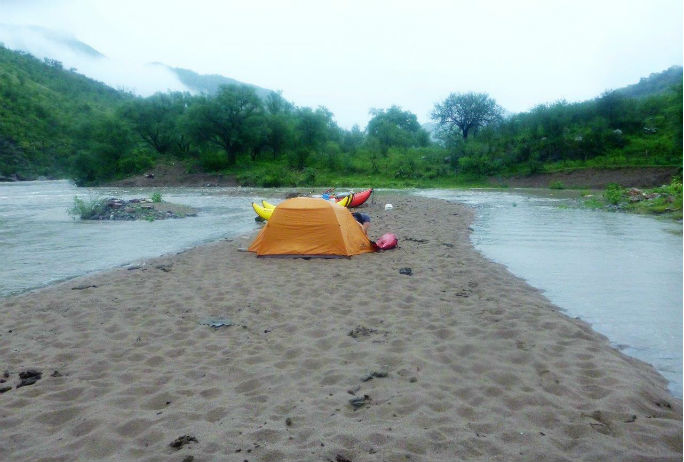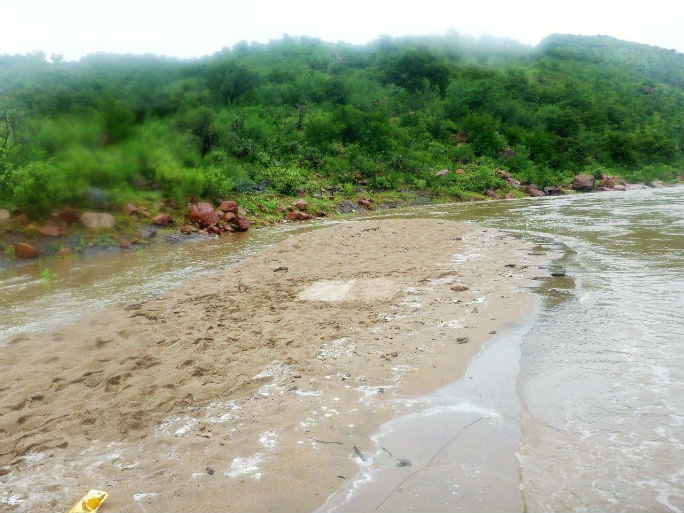I rolled over to an empty sleeping bag. Neil was gone. The early morning light broke through the tent’s zipper as he ducked back in for a few more moments of shut-eye. “Have you checked the boats? Did the water come up?” I mumbled. “Yep, about a foot, I pulled the boats up,” he said. It was not unusual for the Rio Mulatos in northern Mexico to quickly respond to rain, but I wasn’t overly concerned because it had only drizzled throughout the night. We snuggled back into our sleeping bags and attempted to doze off.

Self-consciously I must have been more worried than I realized. My pestering brain wouldn’t allow for a relaxing, pre-dawn, pre-movement doze. “Lacey, don’t be an idiot and go back to sleep,” chimed my common sense. “Check the river, it may still be rising.” I nudged Neil and insisted he unzip his side of the tent so I could check the river. Our boats were nowhere to be seen. I unzipped my side of the tent and the words “Holy! Shit!” streamed uncontrollably out. The river had risen nearly three more feet and flowed only four feet from the side of the tent. If it rose another four inches, we would be underwater.
The river had risen on my side as well, filling a large backwater area we hadn’t noticed the night before. Last night we had set-up camp on a beach; now we perched on a rapidly disappearing island. I stood on this little patch of sand, sized up our situation, and came to the realization that we were in serious danger. I started yelling, “EMERGENCY!” as if someone other than Neil or I stood there. It was only us on this river expedition, no one was going to save our butts. We were on our own.
Quite a few of the rivers I like in Mexico are only large enough to run during the rainy months. I’m no novice to monsoon season flashes and sudden high water. Because of previous sudden high water experiences, I don’t fall asleep unless I have my PFD nearby. You will never find my life jacket clipped to my boat, instead, hunkered down in my sleeping bag, you’ll find me cuddling my PFD. The night before, I had advised Neil to do the same, so fortunately we both had our life jackets close at hand.
We zipped up our PFDs and surveyed the scene to see that our boats had not been swept away, but pushed closer to another island, the bowlines stretched to the limit and disappearing rapidly under the water. Between the boats and us flowed a newly developed river channel. Its tranquil circulation allowed us to wade across the thigh-deep channel. We untied our boats, hopped onto the seats and rowed over to our receding island camp, where we frantically rigged up the remaining items we’d managed to salvage.
We were headed into what would normally be the most fun part of the trip, the class IV+ section of the Barranca Mulatos, but I was not having fun. Traveling downstream, I started having nightmarish visions of what could have been. Thank goodness the flood had not happened in the middle of the night or we might have been swept away.
In a pinch—which I would call this—if we absolutely had to do the canyon in a flood, I wanted some coffee. We obviously had no time for breakfast or coffee during the “emergency.” Keep in mind, I am a coffee fiend and needed no fewer than two or three cups before continuing downstream. As we rushed closer to the canyon, where I knew there would be no spots big enough to set up a makeshift kitchen, especially in high-water, Neil spotted a beach. We rowed to the small eddy, tied off our boats, stuck a stick at the water’s edge (in order to watch the river level) and went off to brew a quick pot of coffee.
By the dregs of my third cup, the river had risen at least two more feet. We really had to think about this; did we want to enter the class IV+ canyon in a flood? Floods have enormous power. The amount of debris in the water raised the risk. I fretted, how much harder the rapids would be in high water? Would there be eddies or would it be one continuous rapid with no chance to catch our breath? Would the waves be so huge we’d flip? What about all the boulders, would the high water transform them into keeper reversals? The biggest problem was that it was only the two of us on a two-boat trip, and I wasn’t confident that either of us could execute a safe and successful rescue if there were no eddies. My worried mind imagined one of us flipping and losing a boat.

We were safe for the moment and decided to wait out the flood a little longer. Our coffee spot (and could-be camp) was still about four feet above the river. At the back edge of the bench was a steep rock wall and cactus slope we could scale to gain another ten feet if the water continued to rise. Farther down river I could see the bench followed the contour of the water and was a few feet higher. We could not see how large or high the bench became because it was covered with thorny mesquite trees, cacti and tall reeds. We went to investigate.
My stomach knotted as we walked higher up the bench. I noticed a crushed down area in the reeds. A pile of tarps and old blankets sat on a rock wall. “Neil, look at that pile of stuff over there,” I pointed out. “Someone sleeps here. Look, there’s a barbed wire fence.” Then I spotted them, tall bright green plants with fan-like leaves—neat rows of healthy marijuana. We had found ourselves marooned on a freakin’ weed farm in northern Mexico! “They might be booby-trapped,” Neil yelled. “Get away, Lacey!” We rapidly retreated to our boats, not wanting to risk the wrath of an armed cartel farmer thinking we were snooping.
Back at our boats the river was not relenting, it had risen another couple of feet. My anxiety level increased – what to do? Our options included camping next to a Mexican marijuana field or continuing downriver with our two-boat party to run a canyon containing difficult rapids in dangerously high water. We had a serious dilemma on our hands—two equally dangerous situations with potentially similar outcomes.

We didn’t see anybody guarding the pot field, but figured they would be back. It was obvious someone slept there. Coming across pot fields isn’t unusual when running rivers in remote and rugged areas of Mexico. I normally ignore these clandestine farms and pretend I don’t see the lush crop. I, then, row like mad, hoping not to be seen by anyone tending the field. With this current situation, I was in unchartered territory and very nervous about it. I didn’t like the idea of camping next to a pot field.
We nervously set up camp as far as we could get from the weed patch—a mere twenty feet. We crossed our fingers and hoped the “farmers” would not find us two gringos. If they did, what would we say? How would we explain what we were doing camped beside them. We practiced our poor Spanish with each other, Neil pretending to be the Narco and I, the gringo being interrogated. “¿Qué estás haciendo? ¿por qué estás aquí?” asked said drug farmer. “No entiendo,” I played along. What would we say in a real situation? To defuse dicey situations during military or police stops I’ve been known to act like a dim-witted Gringa. Responding to every question with a toothy grin, bobbing my head up and down, thumbs in overall straps while mispronouncing “gracias.” The frustrated military or cop gets tired of trying to communicate with me, the typical Norte Americano tourist, which speaks no Spanish, and gives up, letting me pass, hassle-free. Neil and I practiced this silliness, mostly to relieve our nervous tension about our precarious situation, but in my heart I knew this ding-a-ling act might not free us this time.

That night I tensed with every crunch and slither outside the tent, fearing the arrival of the gun-toting Mexican cartel. In over a decade of traveling in Mexico, I’ve never had problems, but the American media paints a grim picture of this country. We are inundated with articles and television programs about the dangers of Mexico. Crazed cartel gang members, corrupt government and police, kidnappings. Even though I’ve not had any problems, those images must have been placed in my subconscious. It was a fitful night without much sleep, and the river kept rising.
When we awoke, unharmed, unshackled, and dry we breathed a sigh of relief. The river was still higher than when we arrived the day before, but less debris floated within and it was starting to recede. With the initial flash flood subsiding, the safest option was to continue into the canyon. We had risked our fate long enough kicking back beside a field of marijuana, someone’s coveted livelihood. As we rigged up, two dogs came loping down the beach. We hurriedly pushed off and silently rowed past the marijuana bench. I could not contain my curiosity, was anyone up there? I glanced up at the bench and sure enough, someone was bent over picking crop, or were they? Maybe they were avoiding a confrontation with us crazed gringos—after all, what were these two lily-white folks doing in their neck of the woods? Maybe we were the scary ones? Maybe they were afraid of us as much as we were afraid of them? With my next glance up they were gone, out of sight.
It was raining again as we rowed into the Mulatos canyon. My heart sunk when I again noticed one of the telltale signs of rising water, increased woody debris— the river was rising yet again! By the time we arrived at the first major rapid the river was much higher than we had seen on our last trip in 2010. We rowed over to the small eddy above the drop, tied off our boats and watched, sizing up the situation.

Rocks that stood out of the water when we first arrived were slowly being drowned and overtaken by muddy rushing water, disappearing into and under the frothy flood. Once again faced with a dicey situation – should we go into a flooding canyon or wait it out in a very uncomfortable spot? At least this time our wait did not include an abundant illegal pot field. There were no verdant planting grounds available for farmers. There was only a steep craggy outcropping with lots of rocks and boulders, no beaches or level areas. We had to figure out how to squeeze in a sufficient camp spot between boulders. The challenge was finding a spot large, level and high enough to wait out the downpour from the sky and the rapidly rising river below, but at least we did not have to worry about the possible wrath of Mexican drug runners in this “camp” as we waited out a second flash flood.




